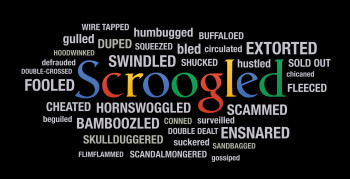
Microsoft’s updated terms of service is a direct shot at Google
Microsoft and Google don’t exactly get along. We’ve watched as the “Scroogled” campaign went from moderately funny to just plain pathetic, and we’ve seen Google repeatedly refuse to support Microsoft platforms. The Scroogled campaign is the most interesting thing to come out of their strained relationship. Microsoft knows that Google’s quest for data makes some people uncomfortable, and they are trying their best to exploit that.
Today Microsoft is sending out emails to address a change in their terms of service. The changes seem to be direct shot at Google. It’s almost as if the “Scroogled” campaign has leaked over to Microsoft corporate identity. In plain English for all to see, Microsoft has boldly claimed to be the anti-Google. Here it is:
Privacy
As part of our ongoing commitment to respecting your privacy, we won’t use your documents, photos or other personal files or what you say in email, chat, video calls or voice mail to target advertising to you.
Transparency
We updated our Code of Conduct so you can better understand the types of behaviors that could affect your account, and added language that parents are responsible for minor children’s use of Microsoft account and services, including purchases.
Simplicity
We tailor our privacy statements for each of our products to help make it easier for you to find the information that is important to you.
The first section is the most obvious shot at Google. Microsoft has made several videos in the past that aim to shed some light on how Google “reads” user emails. The video below is just one example.
Just today we wrote about Google Now reading emails to add events to you calendar. Google also reads emails for flight information, shipping status, and more. Most people who use Google services have opted into these things willingly, but there are those who don’t like Google rifling through their mail. Microsoft is hoping to gain the trust of those users.
Here are some bullet points from Google’s privacy policy for comparison:
We collect information in two ways:
- Information you give us. For example, many of our services require you to sign up for a Google Account. When you do, we’ll ask for personal information, like your name, email address, telephone number or credit card. If you want to take full advantage of the sharing features we offer, we might also ask you to create a publicly visible Google Profile, which may include your name and photo.
- Information we get from your use of our services. We may collect information about the services that you use and how you use them, like when you visit a website that uses our advertising services or you view and interact with our ads and content.
You can see how vastly different the two policies are. Microsoft is talking about what they don’t collect while Google is talking about how they collect it. We’re sure most of you (including us) have no problem with Google’s policy, but Microsoft is betting on the average consumer being afraid. With all the news about the NSA and companies stealing data, this is probably a wise move by Microsoft.
Microsoft, in general, has taken a very safe approach to user data recently. Their new Google Now-esque personal assistant, Cortana, for Windows Phone comes with a “Notebook” feature. The Notebook allows Cortana to know only what the user wants her to know. Google Now, on the other hand, knows an amazing amount about you. There are ways to control this, but it’s not completely obvious, and you won’t get the full functionality of the app.
Are you concerned about Google collecting your information? Should they be playing it safer, like Microsoft? Do you regularly read privacy policies of companies before signing up for their services?